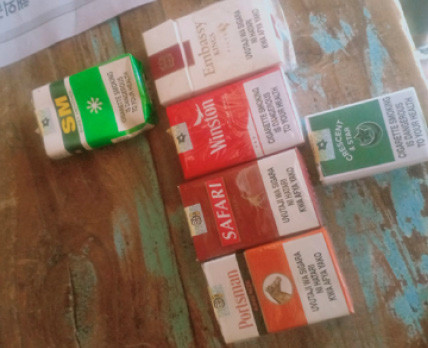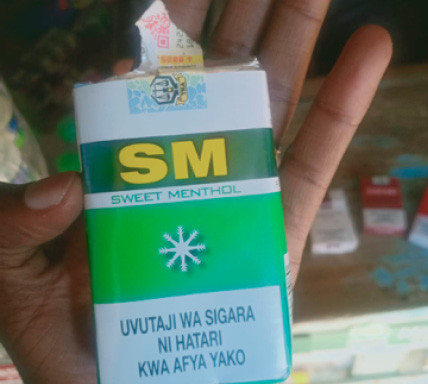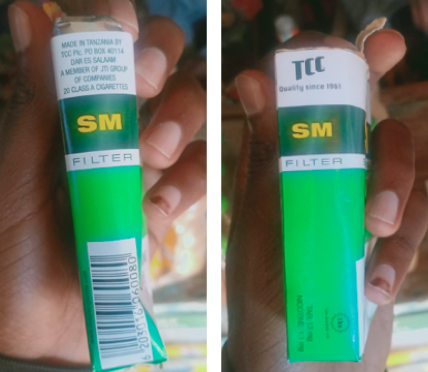Where there’s smoke, there’s fire: investigating the illicit cigarette trade from Tanzania to Kenya.
Our work involves stuffing these personal vehicles and covering them with big bags to make it look like we are from a safari. Most of the officers will not bother to check what is underneath the bags.’1
These are the words of Joseph*, a smuggler from Tanzania, describing the ease with which contraband cigarettes are moved over the border with Kenya. Very light and packed in easy-to-stack boxes, cigarettes are easy goods to smuggle. Kenya’s Anti-Counterfeit Agency has, in recent years, highlighted towns along the Uganda and Tanzania borders as counterfeit hotspots, including for the sale of counterfeit cigarettes.2
Excise tax on cigarettes in Tanzania is much lower than in Kenya, resulting in cigarettes being markedly cheaper in Tanzania.3 This means that cigarettes bought in Tanzania and then smuggled to Kenya can be sold at a higher price than in Tanzania, but still cheaper than the average Kenyan brand. This is known as ‘bootlegging’ and is a form of tax avoidance. However, interviews with smugglers suggest that they also obtain cigarettes from factories in Tanzania from factory workers who smuggle stock out of the factories.4 In this case, the cigarettes are most likely undeclared and untaxed. It is probable that cigarettes smuggled into Kenya take the form of both bootlegged and undeclared stock, given that in both instances profit can be made.
Smuggled cigarettes are popular in towns bordering Tanzania, such as Namanga and Isebania, and also further into the interior in areas such as Kajiado, a suburb near Nairobi.
‘Each stick costs as little as KES 5 [US$0.05] while a Kenyan manufactured stick goes for as much as KES 20 [US$0.19]’, says Juma*, a smuggler at the Namanga border.5 The bootlegged and undeclared cigarettes are generally not sold at large supermarket chains, but rather at more informal kiosks and street vendors. A shopkeeper in Namanga said that many Kenyans opt for Tanzanian cigarettes due to their availability and price. ‘It does not strain someone financially. On a given day, I sell about 20 packets, which [is] good, considering this is a very small town’, he said.6
Frequent raids by Kenya Revenue Authority (KRA) officials, which according to traders happen at least twice a week, have forced traders to sell cigarettes clandestinely. The raids started up again in April 2020, after a court judgment which restored a section of the law giving the KRA the powers to raid premises and seize property. These powers had been nullified in a previous judgment in 2018.7
In response, shopkeepers stick to selling to regular clients and establish new clients surreptitiously, first establishing a relationship before selling the bootlegged cigarettes. Unfamiliar customers asking for cheap cigarettes are treated with suspicion, as KRA officials often investigate in plain clothes.8

A selection of the cigarette brands produced by the Tanzania Cigarette Company (TCC), which are widely available at shops in Kenya. Kenya does not record large-scale imports of cigarettes from Tanzania, nor does TCC produce in Kenya, so the fact these cigarettes are widespread suggests a large volume of cross-border smuggling.
Among the brands commonly bought by Kenyan consumers are Safari, Sweet Menthol, Team Red, Embassy, Kings, Crescent & Star and Winston.9 What is significant about these brands is that most are manufactured in East Africa by the Tanzania Cigarette Company (TCC).10 However, according to official import data, Kenya does not list Tanzania as a major country from which it imports tobacco products.11
The TCC has a subsidiary company in Kenya,12 which could account for the widespread presence of TCC-produced brands. However, this subsidiary has not been trading since 2002, according to TCC annual reports.13 Examples of TCC brands identified on sale by our research team in Kenya were all labelled as being manufactured in Tanzania.14 This suggests that these products are entering Kenya through unofficial channels.


The packaging of the cigarettes on sale in Namanga – such as this packet of Sweet Menthols – suggests that they have been manufactured in Tanzania. The available evidence suggests they have been smuggled across the border.
These unofficial channels include one-stop border posts such as the Holili One-Stop in Taveta. Joseph*, the smuggler, moves his goods through this border point. One-stop posts, as the name suggests, require only one set of customs checks as opposed to two, and were introduced to allow faster movement of goods across borders to stimulate economic development in the region. The advantages of fewer checks may come at the cost of making it harder to identify smuggled goods, something compounded by border officials’ lack of scrutiny when searching vehicles.
The town of Namanga, which straddles the Kenya–Tanzania border, also hosts a one-stop border post, but smuggling is reportedly common in the town. While the border post is in operation along the main road, elsewhere in the town the border is only marked by some open space around 200 feet in width. This strip is often not subject to law enforcement scrutiny as it is perceived to be a grey area where neither country has jurisdiction, even though this may not be the case in actual fact. In the past, this area has been identified as a site of smuggling for illicit charcoal and timber.15 Reporting from the Tanzanian newspaper The Citizen in 2020 found that this area was being used by people avoiding COVID-19-related health checks at the formal border post.16
Both Tanzanian and Kenyan nationals engage in cigarette smuggling.17 Nondescript warehouses in border towns, including Namanga, serve as depots from which the cigarettes are later moved across the border.
Differences in legislation and tax regimes in Tanzania and Kenya
The tobacco industry has a large influence in Tanzania, and the Global Tobacco Industry Interference Index 2020 found that tobacco legislation has been delayed due to industry pressure.18 The Tanzanian government chose not to raise excise duty on cigarettes in 2018,19 following requests from the TCC.20
The Tobacco Industry Act of 2001 established a board whose role is to ‘advise government on policies and strategies to promote and develop the tobacco industry’,21 members of which have ties to the industry. This creates an environment that is not conducive to effective tobacco control, by giving the industry the chance to shape policy.
Despite this, Tanzania has experienced some success with the introduction of an electronic tax stamp system, which has contributed to a 34% increase in revenue, mainly from excisable products, including cigarettes.22 However, weak border controls mean that cigarettes are still easily smuggled, despite being affixed with electronic tax stamps. Lack of transparency on government meetings with the tobacco industry, and benefits from industry bodies (for example through corporate social responsibility schemes), may also drain political will to address any issues in the industry such as illicit trade.23
This is in contrast to Kenya, which has implemented much tighter controls on tobacco in terms of taxation, tracking and tracing.24 The Kenyan system has reportedly contributed to a reduction in illicit products manufactured in the country.25 Kenya is one of very few nations in the region party to the WHO Protocol to Eliminate Illicit Trade in Tobacco Products under the Framework Convention on Tobacco Control.26 Tanzania has signed this protocol but not ratified it. The regular raids by the KRA demonstrate the greater emphasis on policing the illicit trade in Kenya.
These contrasting approaches have led to the differences in tobacco prices on either side of the border, which creates an incentive for smuggling.
However, while the differences in approach between Kenya and Tanzania, in particular the differences in excise tax regimes, may create an incentive for tobacco smuggling, this one factor alone is not enough to account for a smuggling route arising. Research from around the world shows that countries with high tax differentials can have little to no cross-border smuggling. Other conditions such as weak or corrupt governance or gaps in law enforcement are required, as well as the profit incentive, for cross-border smuggling to arise. These conditions have, it seems, arisen along the Kenya–Tanzania border.

Trucks wait at the Kenya–Tanzania border crossing in Namanga. Cigarettes are smuggled from Tanzania across border points such as Namanga, as higher tax rates on cigarettes in Kenya mean they can be sold on for a profit.
Photo: EastAfrica–Market/Reuters/Noor Khamis
Law enforcement attitudes
Joseph*, the smuggler, claims that border officials’ laxity makes smuggling cigarettes easy, as searches of vehicles are often not thorough. Juma*, the smuggler in Namanga, agrees with Joseph that bicycles and motorcycles are most often used for smuggling as border officials rarely inspect these types of vehicles.27
According to Juma, ‘panya’ routes28 – non-official border crossings (‘panya’ means mouse in Kiswahili) – became more commonly used during the closure of border posts at the onset of the pandemic.29 However, sometimes he comes across border patrols. ‘We often part with a few shillings so that they can keep silent,’ he added.
Juma claims that police officers rarely make arrests of smugglers as both groups come from the same communities. ‘Ujamaa’, which literally means ‘kinship’ or ‘community’ in Kiswahili, was used to describe the feeling of camaraderie between local police and smugglers. ‘Ujamaa’ was adopted as a social and economic ideology by then Tanzanian president Julius Nyerere in the 1960s to promote cooperative economics and a sense of national identity in postcolonial Tanzania. One cannot arrest their ‘relatives’, says Juma.30 In some cases, some of the police are allegedly on the smugglers’ payroll and receive ‘gifts’ regularly. ‘Once you smuggle … for the first time and identify yourself to the police, you build a rapport making it hard for them to put you behind bars,’ he said.31
Officers at Namanga Police Station claimed that it was hard to arrest the smugglers as there was a law stipulating that no one living within a 15-kilometre radius of the border post who is found with an illegally imported item can be arrested, as this is considered a privilege.32 However, the GI-TOC could find no legal validation for this claim. This perhaps suggests the ‘ujamaa spirit’ to which Juma refers. GI-TOC’s research into illicit economies and border regions has often found that the social dynamics around borders – such as the fact that often borders split ethnic groups and communities who live in both countries, and that those tasked with managing borders are part of these community dynamics – are major factors in what makes these borders porous.
The profitability of smuggling and lack of political will to address the issue ensures that the smuggling of cigarettes continues. Cigarette smuggling from Tanzania undermines the efforts made by Kenya to reduce illicit trade prevalence and highlights the potential need for policy harmonization across the region.
The Global Initiative Against Transnational Organized Crime does not accept funding or contributions from the tobacco or cigarette industry.
Notes
-
Interview with Joseph, cigarette smuggler at Voi, Taveta, 1 March 2021. ↩
-
Chacha Mwita, Is Tanzania, Uganda, dumping counterfeits in Kenya?, The Exchange, 12 February 2019, https://theexchange.africa/industry-and-trade/is-tanzaniauganda-dumping-counterfeits-in-kenya/. ↩
-
As of 2020, Kenyan excise rates were approximately KES 66.26 (US$0.61) per pack for filtered cigarettes and KES 47.68 (US$0.44) per pack for unfiltered cigarettes. In Tanzania, the excise per pack is US$0.07 and US$0.11 for filtered and unfiltered cigarettes respectively. Sources: Kenya adjusts specific excise duty rates for inflation, EY, 9 October 2020, https://www.ey.com/en_gl/tax-alerts/kenya-adjusts-specific-excise-duty-rates-for-inflation; Tanzania – Corporate – Other taxes, PwC, 18 January 2021, https://taxsummaries.pwc.com/tanzania/corporate/other-taxes. ↩
-
Interview with smugglers at Namanga, 30 January 2021; interview with a journalist in Tanzania, 30 March 2021. ↩
-
Interview with a smuggler, Namanga, 26 January 2021. ↩
-
Interview with a shopkeeper, Namanga, 26 January 2021. ↩
-
KRA regains powers to raid premises and seize property, Business Daily, 27 April 2020, https://www.businessdailyafrica.com/bd/economy/kra-regains-powers-to-raid-premises-and-seize-property-2288058. ↩
-
Interview with a shopkeeper, Namanga, 26 January 2021. ↩
-
GI-TOC field research, February 2021. ↩
-
Some of these brands are Japan Tobacco International brands manufactured under license. See Japan Tobacco International website, Tanzania: https://www.jti.com/africa/tanzania. ↩
-
Trend Economy, Kenya imports of cigars, cheroots, cigarillos, cigarettes, tobacco and tobacco substitutes (2006–2020), 5 March 2021, https://trendeconomy.com/data/h2/Kenya/2402. ↩
-
Tanzania Cigarette Company, Annual Report for year ending 31 December 2019. ↩
-
Ibid. ↩
-
GI-TOC field research, Namanga, February 2021. ↩
-
Nathan Siegel, An East African border town struggles with growing pains, Mongabay, 18 November 2016, https://news.mongabay.com/2016/11/an-east-african-border-town-struggles-with-growing-pains/. ↩
-
It’s businesses as usual at Namanga despite Covid-19, The Citizen, 5 April 2020, https://www.thecitizen.co.tz/tanzania/news/it-s-businesses-as-usual-at-namanga-despite-covid-19-2707080. ↩
-
Interviews with smugglers, Namanga, February 2021. ↩
-
Tobacco Industry Interference Index 2020, https://exposetobacco.org/wp-content/uploads/GlobalTIIIndex2020_Report.pdf. ↩
-
Speech by the Minister for Finance and Planning, Hon. Dr Phillip I Mpango (MP), Presenting to the National Assembly, The Estimates of Government Revenue and Expenditure for 2018/2019. ↩
-
Tobacco Industry Interference Index 2020, https://exposetobacco.org/wp-content/uploads/GlobalTIIIndex2020_Report.pdf. ↩
-
Tobacco Industry Act of 2001, Part II, section 5(1)(a). ↩
-
Hilda Mhagama, Tanzania: Electronic stamp pushes up revenue by 34pc, AllAfrica, 8 July 2020, https://allafrica.com/stories/202007080347.html. ↩
-
Tobacco Industry Interference Index 2020, https://exposetobacco.org/wp-content/uploads/GlobalTIIIndex2020_Report.pdf. ↩
-
Hana Ross, Kenya: Controlling illicit cigarette trade in Controlling Illicit Tobacco Trade: A global review of country experiences, Technical report of the World Bank Group Global Tobacco Control Forum, 2019; Campaign for Tobacco-Free Kids, Track and trace systems to address the illicit trade of tobacco products: Best practices and country experiences, May 2019, https://www.tobaccofreekids.org/assets/global/pdfs/en/IL_track_trade_en.pdf. ↩
-
Hana Ross, Kenya: Controlling illicit cigarette trade in Controlling Illicit Tobacco Trade: A global review of country experiences, Technical report of the World Bank Group Global Tobacco Control Forum, 2019. ↩
-
Jaindi Kisero, Step up war on cigarette smuggling, Business Daily Africa, 17 September 2020, https://www.businessdailyafrica.com/bd/opinion-analysis/columnists/step-up-war-on-cigarette-smuggling-2301588. ↩
-
Interviews with a smuggler, Namanga, 17 February 2021. ↩
-
‘Panya route’ generally refers to a secret path or a road that lies ‘off the beaten track’. Routes like these are traversed usually to avoid detection, often along borders between countries. ↩
-
Eleanor Wiseman, The effect of the Covid-19 pandemic on trade, corruption, and supply chains, Innovations for Poverty Action, 2020, https://www.poverty-action.org/recovr-study/effect-covid-19-pandemic-trade-corruption-and-supply-chains. Interviews with smugglers, Namanga, February 2021. ↩
-
Interview with a smuggler, Namanga, 26 January 2021. ↩
-
Ibid. ↩
-
Interview with a police source, Namanga Police Station, 26 January 2021 ↩
